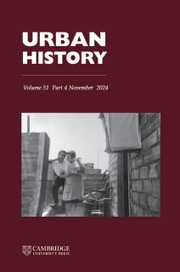No CrossRef data available.
Article contents
Vera Bácskai and her significance in the development of European urban history: a personal account
Published online by Cambridge University Press: 16 July 2021
Abstract
This account of Vera Bacskai's contribution to European urban history after 1990 is a personal narrative, written by a friend and collaborator. It argues that her role was multi-dimensional. It was founded on her major publications on Budapest and small towns, shedding a crucial East Central European light on European urbanization. It was underpinned by her participation in various international projects like the EU TEMPUS programme which created strong institutional bonds with Western universities as well as opportunities for Hungarian students through exchange programmes, international workshops and the like. Not least, she was a strong pillar in the construction of the European Association for Urban History. When she joined the committee in 1991, it was still an embryonic body. In 1996, she organized the successful and important Budapest conference. When she retired from EAUH in 2004, its conferences were attracting many hundreds of researchers, from across Europe and beyond.
- Type
- Survey and Speculation
- Information
- Copyright
- Copyright © The Author(s), 2021. Published by Cambridge University Press.
Footnotes
This is not intended as an obituary or biographical account of Vera Bácskai, nor less a critical account of Central European historiography which I am self-evidently unqualified to write. Rather, it is an attempt to give a personal, subjective impression of some of the opportunities and issues for international collaboration in the field of European urban history that were created by the collapse of Communism and the role of Vera as a key actor in that process.
References
1 For Dyos and his importance, see G.W. Davies, ‘The rise of urban history in Britain c. 1960–1978’, University of Leicester Ph.D. thesis, 2014; Jones, P., Unfinished Work: An Essay in Honour of H.J. Dyos 1921–1978 (Leicester, 2010)Google Scholar; also P. Clark, ‘The city’, in P. Burke (ed.), History in the Twentieth Century (Oxford, 2002), esp. 42–7.
2 See on this, P. Corfield, Honouring Vera Bácskai, www.penelopejcorfield.com/honouring-vera-bacskai-1930-2018/ (accessed 22 Nov. 2020).
3 István Hajnal (1892–1956), Hungarian social historian, historian of technology and palaeographer. His pioneering approach to the relationship between history, literacy and sociology remained unacknowledged in his lifetime and he was dismissed from his professorship on political grounds. His oeuvre has gained recognition from the 1980s onwards.
4 For the origins of European co-operation in the field see, for instance, Clark, P., ‘Early years of the European Association for Urban History’, Helsinki Quarterly, 2 (June 2016), 89–91Google Scholar.
5 Vera Bácskai, ‘Small towns in Eastern Central Europe’, in P. Clark (ed.), Small Towns in Early Modern Europe (Cambridge and Paris, 1995, 2002).
6 V. Bácskai, ‘Budapest and its hinterland: the development of twin cities 1720–1850’, in P. Clark and B. Lepetit (eds.), Capital Cities and Their Hinterlands in Early Modern Europe (Aldershot, 1996), 183–9.
7 Clark, ‘Early years of the European Association for Urban History’.



